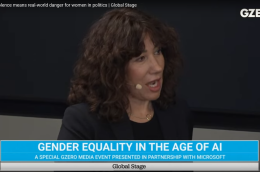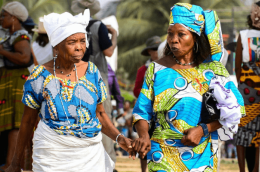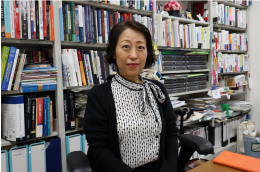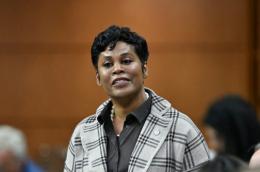Parliaments & Representatives
Main navigation
In a compelling dialogue from a GZERO Global Stage discussion on gender equality in the age of AI, Lucia Nicholsonová, former Slovak National Assembly vice president and current member of European Parliament for Slovakia, recounts her harrowing personal experiences with disinformation campaigns and gendered hate speech online.
Ms. Nicholsonová read example messages she receives online, such as, "Damn you and your whole family. I wish you all die of cancer."
She also has faced false accusations of past criminal activity through deliberate online misinformation campaigns, which she says led to endured public humiliation and threats, even experiencing strangers spitting on her in the streets. These attacks were fueled by misogyny and prejudice and took a toll on her mental well-being and family life.
As Ms. Nicholsonová recalls, “It was a real trauma because I mean, at some point I wasn't able to go out of my home because I felt so threatened.”
The conversation was presented by GZERO in partnership with Microsoft and the UN Foundation. The Global Stage series convene heads of state, business leaders, technology experts from around the world for critical debate about the geopolitical and technology trends shaping our world.
Read here the full article published by GZERO Media on 21 March 2024.
Image source: GZERO Media
As part of Strathclyde Women's Week 2024, we are focusing on the work of Humanities & Social Sciences academics whose research relates particularly to the experiences of women and girls.
Dr Stefanie Reher is a Reader in Politics at the University of Strathclyde, working within the Department of Government & Public Policy. Dr Reher's research focuses on political representation, behaviour, and attitudes.
She is currently working on several projects about the representation of disabled people in politics. Last year - in collaboration with Prof. Elizabeth Evans of the University of Southampton - she published Gender, disability and political representation: understanding the experiences of disabled women in the European Journal of Politics and Gender.
We asked Dr Reher about the barriers disabled women face to participation in representative politics, the methods behind the research and what needs to be done to improve inclusion.
Click here to read the full article published by the University of Strathclyde on 20 March 2024.
Image source: University of Strathclyde
It is common knowledge that despite the invaluable contribution of women to Nigeria’s electoral process since the return to civil rule in 1999, the system has not given them their fair share of reward and recognition that they deserve.
Nigeria’s women have historically had low participation rate in political party positions, whether elected or appointed.
More than two decades after the Beijing Declaration from the Fourth World Conference on Women, governmental and non-governmental groups have tried to boost female engagement in politics. Unfortunately, the issue of underrepresentation has remained.
In every election circle, many women submit nominations for various political offices, only a few receive the nod of their parties to run in the general election due largely to financial limitations, cultural preconceptions and socio-political marginalisation by men.
Click here to read the full article published by the Business Day Nigeria on 18 March 2024.
Image source: Business Day Nigeria
SPOKANE, Wash. – International lawmakers met on March 13 to discuss ways of increasing women’s political participation as disparities in representation between men and women continue on local, national and international levels.
The 68th Session of the Commission on the Status of Women, which included US, Canadian, Colombian and British leaders, focused on broad strategies to increase women’s civic representation.
“[Experts] highlighted how longstanding barriers to women’s political participation and leadership—including lack of access to political networks and resources as well as gender-based violence both online and offline—continue to undermine their inclusion and advancement in democratic processes,” the US Department of Justice (DOJ) said.
According to Pew Research Center data from March 2023, less than a third of United Nations member states have ever had a woman leader.
Click here to read the full article published by Fox 28 on 16 March 2024.
Image source: FOX 28
Thailand was once regarded as one of the most progressive in fostering gender equality. It was the second country in Asia to grant women the right to vote, as far back as 1932. A recent report, “Freedom in the World 2024”, however, shows that women in Thailand remain overlooked in politics and government at all levels.
The study by Freedom House, a US-based political advocacy organisation, said that women’s interests are generally not prioritised in political life.
The Kingdom got two out of four points in the report’s “political rights and electoral opportunities for various segments of the population” section.
“If we [women] do not work outstandingly either while working in a [House] committee or debating in parliament, we won’t be interested. It seems like we need to try harder than the men,” says Sasinan Thamnithinan, a Move Forward Party MP, in an interview with The Nation.
"Women are not decorative flowers in politics," says Sasinan, 34. “We are capable of talking about serious social issues in parliamentary debates like the men do, such as police and army reform, not just so-called feminine topics like household violence,” she says.
The lawmaker is among 32 female politicians, out of the total of 151, who secured their MP seats under the Move Forward banner in the May 14 general election. Move Forward has the highest number of women MPs among all parties.
Click here to read the full article published by The Nation Thailand on 16 March 2024.
Image source: The Nation Thailand
TOKYO -- A study group headed by Mari Miura, a professor at Sophia University's Faculty of Law in Tokyo, with an objective to achieve gender equality in Japan from local levels, has compiled a Japanese gender gap index by prefecture. Using the same method as the global gender gap index, the group collects data on women's participation in local politics, economy, education and administration. Based on the latest data for the year 2023, the Mainichi Shimbun looked into factors contributing to gender inequality across Japan and efforts to tackle the issue.
Tomoko Kogoshi, 60, served as a Yamanashi Prefectural Assembly member for four terms spanning 16 years and retired in spring 2023. For the latter half of her time in the prefectural assembly, she was the only female member.
Click here to read the full article published by The Mainichi on 19 February 2024.
Image source: The Mainichi










